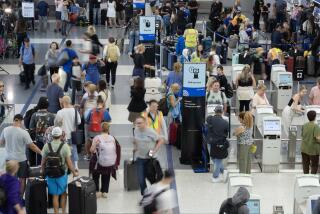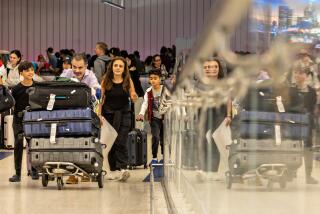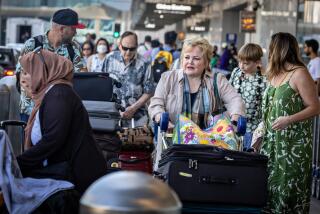Holiday travelers greet security tactics with weary resignation
- Share via
Reporting from Washington and Los Angeles — Despite the warnings about compromised civil liberties, offended modesty, grass-roots protests and possible delays, about 2 million Americans nonetheless flocked to their local airports Wednesday to engage in those most familiar of rituals brought on by the age of terrorism:
They stood in line. They placed baggies containing small bottles of lotion into X-ray bins. They removed shoes. And some put up with more intrusive hassles — X-rays that revealed an image of their naked selves and, for a select few, aggressive pat-downs.
What other choice did they have, if they wanted to get where they needed to be for Thanksgiving?
At Los Angeles International Airport on Wednesday morning, Aaron Coleman, 44, a pastor, said he was aware of the furor surrounding the new federal safety measures — the full-body scans and pat-downs that include searches in the genital areas. The gradual phase-in of the new procedures was accelerated after U.S.-bound mail bombs from Yemen were intercepted last month.
Coleman said he’d really rather not have a pat-down.
“But I will have to get it if they want me to,” he said.
Such weary acceptance of the latest new normal in air travel was one reason airports around the country experienced generally smooth operations at preflight checkpoints as of late Wednesday. Overall, it seemed that the desire to get it all over with and get on board eclipsed activists’ call to protest.
A number of Web-based movements urged passengers to refuse to be subjected to the full-body scans and opt instead for time-consuming pat-downs.
Airports did see their share of protests Wednesday. But they were more of a sideshow than a roadblock for the millions of fliers taking part in the nation’s annual pre-Thanksgiving rush.
At LAX, about 20 protesters, organized by the website wewontfly.com, handed out fliers reminding people that they have the right to opt out of the body scans, as well as stickers that read, “Don’t touch my junk”— the now-famous words used by Oceanside resident John Tyner as he recently underwent a pat-down. About 133 LAX passengers ended up opting for pat-downs, officials said.
In Denver, four activists handed out pocket-sized copies of the Constitution and called for the dissolution of the Transportation Security Administration.
In Salt Lake City, a man strolled around the airport in a skimpy Speedo bathing suit, according to the Associated Press, an apparent attempt to make an anti-TSA statement — or, at least, a few waves on YouTube.
At John Wayne Airport in Santa Ana, passenger Victor Allen, a Seattle computer programmer visiting his family in California, suspected that TSA workers were friendlier than usual.
“My impression was they put all their nicest, friendliest staff members on today,” said Allen, 38. “I got the impression they were really trying not to get any bad press today.”
Ridgeway Wilson, 21, a senior at the University of Pennsylvania, flew into John Wayne from Philadelphia International Airport, where she said security personnel were usually “blunt bordering on rude.” Yet they were all smiles Wednesday morning. “They’re all nice, like, ‘Please stand in this line.’ …Even in Philly,” she said.
Most passengers throughout the nation paid little attention to protest antics.
Southwest Airlines passenger Melanie Magee, 50, had decided that she would choose a scan over a pat-down at LAX.
“I don’t want them groping me,” she said.
But Magee, who was headed to Mississippi, said she was accustomed to an intense level of security after living in Israel for seven years.
“I have no problem with it,” she said. “It’s for keeping people safe.”
That kind of qualified acceptance was reflected in a Gallup survey released this week. It found that 7 in 10 frequent travelers believed the potential loss of personal privacy from full-body scans or pat-downs was worth it to prevent acts of terrorism, while 27% said it was not.
Fifty-seven percent said they were not bothered by the full-body scans, though the same percentage said they were either angry or bothered by the pat-downs.
TSA Director John Pistole has defended the new procedures, and other federal officials have acknowledged that they are largely designed to detect PETN, an explosive substance favored by Al Qaeda and its allies. The search methods, however, have drawn controversy across the political spectrum.
The American Civil Liberties Union has said the body-scanning machines subject fliers to what amounts to a “virtual strip search.” Some conservatives have described the new rules in the broader context of what they see as an invasive and overreaching federal power under a Democratic president.
“If he thinks this is an appropriate way for us to deal with security, as he has defended, then I’ve said, OK, Mr. Obama, take your wife, your two daughters and your mother-in-law to Washington Reagan National Airport and have them publicly go through both the body scanner and the full enhanced pat-down in front of others,” said Mike Huckabee, the former Arkansas governor and current talk-show host, on Fox TV recently.
“And if it’s OK for your wife, your daughters and your mother-in-law, then maybe the rest of us won’t feel so bad when our wives, our daughters and our mothers are being put through this humiliating and degrading, totally unconstitutional intrusion of their privacy.”
Some travelers on Wednesday also had serious concerns about the new rules.
Brian Thomas and Jessica Knutson, Brooklyn residents traveling together to Thomas’ hometown of New Orleans, arrived for their flight out of New York’s John F. Kennedy International Airport four hours early in anticipation of taking part in the “opt-out” campaign and enduring a pat-down search.
They cited concerns about the level of radiation in the X-rays and invasion of privacy as their reasons for not wanting to walk through one of the new scanners. Despite government assurances that the radiation levels are negligible, “they say one thing, and 30 years later we find out something else,” Knutson said.
Both also questioned why the more aggressive pat-downs had been introduced at the same time as the scanning machines.
“You reach this place, and all of a sudden it’s OK to touch my groin,” Thomas said as they waited in the departure lounge. “This is really the only instance where people feel their freedom is being taken away.”
Others couldn’t resist a bawdier take on the topic.
In Atlanta, Charles Sanders, a 71-year-old shoeshine man, told client Jennifer Walker that the hubbub was all coming from “these old women” worried they’d be busted with all the “false stuff” that was artificially enhancing their figures.
“Oh, is that it?” said Walker, 37, who was heading to San Francisco after her shoeshine.
At Chicago’s O’Hare International Airport, Darnell Martin, 37, said he went through the full-body scan, but it didn’t bother him. He was waiting to catch a flight to Las Vegas to visit family for the holiday.
As a medical equipment salesman, Martin said, he’s used to technology. Though he didn’t ask for the pat-down, it wouldn’t have bothered him either, he said.
Plus, “I’m going to Vegas,” he said jokingly. “People pay money for that in Vegas.”
Memoli reported from Washington and Pool from Los Angeles. Times staff writers Richard Fausset in Atlanta, Christopher Goffard in Santa Ana, Nicholas Riccardi in Denver, Tina Susman in New York and Chicago Tribune reporter Angela Rozas contributed to this report.
More to Read
Sign up for The Wild
We’ll help you find the best places to hike, bike and run, as well as the perfect silent spots for meditation and yoga.
You may occasionally receive promotional content from the Los Angeles Times.








